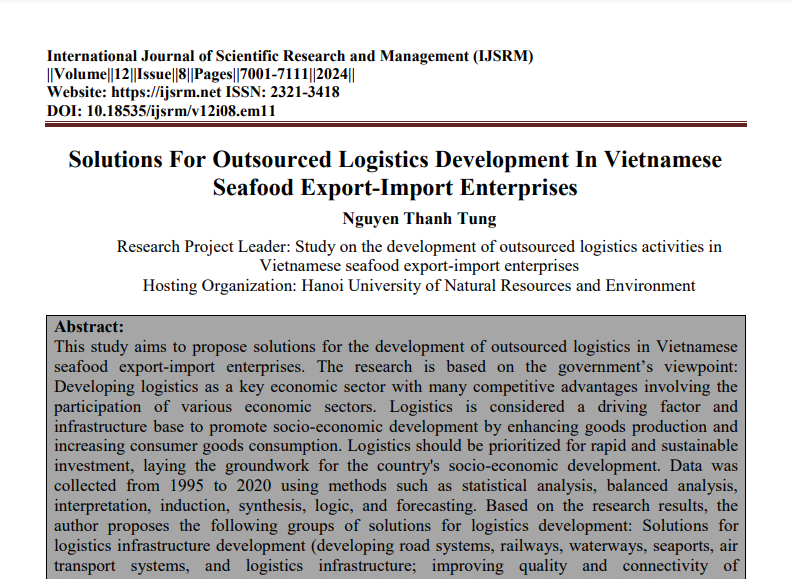
Submission to VIJ 2024-08-16
Keywords
- Outsourced logistics, seafood
Copyright (c) 2024 Nguyen Thanh Tung

This work is licensed under a Creative Commons Attribution 4.0 International License.
Abstract
This study aims to propose solutions for the development of outsourced logistics in Vietnamese seafood export-import enterprises. The research is based on the government’s viewpoint: Developing logistics as a key economic sector with many competitive advantages involving the participation of various economic sectors. Logistics is considered a driving factor and infrastructure base to promote socio-economic development by enhancing goods production and increasing consumer goods consumption. Logistics should be prioritized for rapid and sustainable investment, laying the groundwork for the country's socio-economic development. Data was collected from 1995 to 2020 using methods such as statistical analysis, balanced analysis, interpretation, induction, synthesis, logic, and forecasting. Based on the research results, the author proposes the following groups of solutions for logistics development: Solutions for logistics infrastructure development (developing road systems, railways, waterways, seaports, air transport systems, and logistics infrastructure; improving quality and connectivity of infrastructure); solutions for information technology development (designing functional public information platforms for seafood logistics centers, building public information platforms for the seafood logistics sector, and developing IT infrastructure); solutions for fisheries industry policy development (standardizing operational processes, establishing a unified legal framework for logistics operations, modernizing customs and other clearance procedures, issuing preferential policies to encourage investment in logistics, and establishing logistics centers in the seafood industry); solutions for human resource development (enhancing logistics education at training institutions, increasing internal employee training within enterprises).
References
- Georgia Institute of Technology, Capgemini, DHL and Oracle; "Annual Third-Party Logisstics Reports"; 2021-2022
- Word Bank; "Connecting to Compete: Trading Logistics in the Global Economy"; 5/11/2017
- Word Bank; "Connecting to Compete: Trading Logistics in the Global Economy"; 10/1/2020
- Word Bank; "Connecting to Compete: Trading Logistics in the Global Economy"; 2022
- Thomas N.Duening, Rick L.Click "Essentials of business process outsourcing".2015
- Alan Rushton and Steve Walker; "International logistics and supply chain outsourcing " 2017
- Mark J Power, Kevin C Desouza, Carlo Bonifazi; " Outsourcing Handbook; 2016
- Thomas A. Cook; " Global sourcing logistics"; 2017
- Bayles, D.L., E-commerce Logistics and Fulfillment: Delivering the Goods, Upper Saddle River, NJ, USA, Frentice hall, (2021)
- Bauer, M.J. et al, E-Business: The Strategic Impact on Supply Chain and logistics, Cousil of Logistics Management Press, (2023).
- Lawrence, F.B et al, E-Distribution, Thomson South- Western, (2023)
- Reynolds, J., Logistics and Fulfillment for e-business, (2021)
- Practical Guide to Mastering Back office Function for Online Commerce, Pearson Education
- Ross, D.F., Introduction to e-Supply Chain Management: Engaging Technology to Build Market-Winning Business Partnership, Palgrave macmillan, (2022)
- Poirier, C.C. and Bauer, M.J., Esupply Chain: using the Internet to Revolutionalize your Business, Prentice Hall, (2020)
- Ronald H. Ballou, Business logistics managerment-Third Edition, Prentice- Hall International, Inc, (2021)
- Donal J.Bowersox, David J.Closs, Logistics management, Mc Graw-Hill International Edition, (2021)